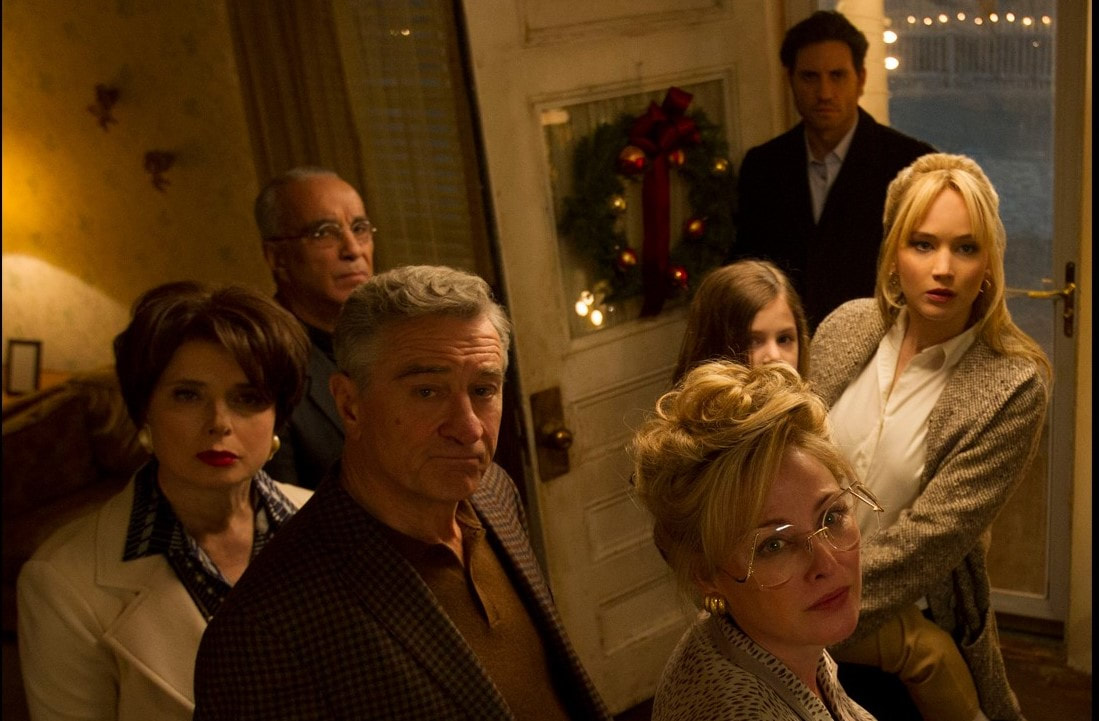This poisonous center cannot hold for Joy, and in one of many of the film's overly-literal dreams, she attends a funeral for her younger self. Her subconscious taking a sledgehammer to the back of her head engenders an entrepreneurial spirit to go with her inventive one, and while boating with her father's new rich girlfriend Trudy (Isabella Rosselini), she comes up with an idea for a self-wringing mop. She drags her family kicking and screaming into her new venture, making use of Trudy's money, her sister's labor, and her dad's factory space to come up with a prototype. With all the resources sunk into Joy's Miracle Mop, the stakes are high and the nagging by her terrible family is nonstop, but business is slow until her ex gets her hooked up with home shopping network QVC, run by Neil Walker (Bradley Cooper). At every step of the process, obstacles of the personal, logistical, and professional are thrown in Joy's path, some believable and some a stall to create false tension. She finally experiences great success on QVC, but her idiot family continues to make her business harder to run than it should be.
These kinds of entrepreneurial success stories are occasionally worth the effort if they have something extra added onto their skeleton. The Social Network had all its technical prowess in addition to concerning itself with what success can cost a person, while Flash of Genius, for all its by-the-books direction, was also about obsession. The Aviator crippled its protagonist and The Pursuit of Happyness gave its lead farther to go. Joy doesn't have much of a hook beyond the unbelievable albatross that is her family. She is a woman who put her career on hold for her family, despite her husband never compromising on his dreams, but that's not the focus. This might be one of those stories that doesn't have enough drama in it and Russell is unable to concoct enough of it to sustain a film. What he settles on is just unbearable. It's not noble of Joy to stand by these people; as Russell portrays them, Joy needs to get as far away as possible. They repeatedly make bad decisions or hire bad personnel, admit to their failures, and then tell Joy that she's not cut out for this business, giving voice to the artificiality of their existence. De Niro and Rohm play melodramatic one-note villains, suitable thanks to the soap opera always running in the background that Joy's mother has on nonstop. If this is on purpose, which it surely is, then it's lost on this viewer.
The awfulness of the supporting characters is exacerbated by Russell's standard technique for filming conversations and arguments. He cannot get enough of high-volume scream fights that are made wince-inducing by the addition of a soundtrack playing on top of them. It's sound mixing for no reason, like having two TV's playing at the same time. Lawrence, to her credit, is ably communicating how exhausting it is to live with these monsters, so the value of yet another eardrum shattering argument is nil. Russell also badly misjudges the kind of film he's making, as talk of loans or contracts is treated with the seriousness and tone and delivery of a mob summit. Trudy has rules for who she loans her money to, but there's so little creativity or life given to those rules that the scene, and her seriousness in the scene, become laughable.
Lawrence, playing 10 years above her age because if Hollywood is lacking anything, it's actresses in their 30's who need work, does what she can in an Oscar-nominated performance, but it's nowhere near enough to rescue Joy. Russell has spent any goodwill he generated from his high point in Three Kings and in sharp genre fare like The Fighter. Silver Linings Playbook fundamentally misunderstood its characters, American Hustle confused style with substance, and Joy is practically unwatchable. Maybe Russell needs to spend another ten years in the wilderness before reemerging, because his so-called quadrilogy of reinvention has devolved into actors screaming at each other. D

 RSS Feed
RSS Feed